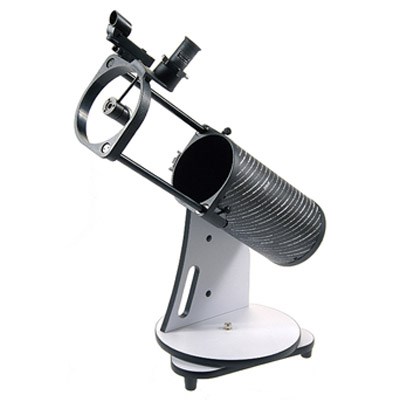![]() You don't need to be an 'investor' to invest in Singletrack: 6 days left: 95% of target - Find out more
You don't need to be an 'investor' to invest in Singletrack: 6 days left: 95% of target - Find out more
I'm getting a cheap 130mm reflector telescope to try a bit of stargazing in my back garden.

Looking fwd to trying it out. I'd like to see as many planets as possible and look at the deep sky a bit too.
Any tips other than don't look at the sun? 😀
Hi
A few things to remember:
- the magnification is due to the eyepiece and not the telescope
- you'll get at most 50x the aperture size in inches at best (usually half),the above will give you about 250x magnification maximum.
- get as good an eyepiece as you can afford; choose a few that cover the range you need
- max magnification is not the ideal, especially with planets
- the above pic is a newtonian, make sure you collimate if you can to get a clear image
- deep sky is going to be a challenge possibly with this scope, but you should be able to get to see Orion's nebula.
- use red light torches and get your eyes used to the dark, use averted vision too.
- good website is Clear Outside for weather checks.
- other good websites are Stargazers Lounge and Cloudy Nights
- Wrap up warm!
Good book to get is 'Turn Left At Orion' as a starter to show you what you can look at.
50x on that 'scope will work well, the issue could be the mounting as its not equatorial: it could be a pain to keep the scope aligned on your target meaning that higher magnification lenses may be a bit trickier to use.
Start with the moon because its easy to line the telescope up on and even at 50x it will look so different to what you expect, especially if its not full: the terminator line really shows the mountains off well.
Then try Jupiter, bit harder to find (but not much) as you can see the four Galilean moons, again, 50x will work well with this. You might also be able to see the great red spot
Saturn: you will be able to see the rings
Mars and Venus don't show any real detail, one is reddish, one is just a bright point.
Orion Nebula, again, easy to find and take about 2-3minutes to properly look at it and understand its a big gas cloud. it wonderments look like the photos though, it will not be a bright splash of colour, more like a white smudge.
I'd absolutely recommend getting a copy of 'Turn Left At Orion', as mentioned above. If you want to get the most out of a Dobsonian (the mount) Newtonian Reflector (the telescope), you'll need to learn to recognise the main constellations, and then 'star-hop' to your target of choice. Essentially like joining the dots in the sky.
The basic eyepieces supplied with Skywatcher scopes are okay to begin with. The x25 eyepiece will give you a magnification of around x26, while the x10 eyepiece will bump that up to around x65 on that scope. You divide the focal length of the scope by the eyepiece, to get your magnification strength.
Start with the Moon, there's not a huge amount to see in the skies at the moment as it doesn't get properly dark over the summer months.
Good phone based planetariums are Sky Safari (my favourite) and Stellarium. These will give you a virtual representation of the night sky from your location, allowing you to see what's in the sky at the moment. For instance, Orion's nebula, Mars, Jupiter and Saturn are all pretty much below the horizon now until late autumn, but there are fabulous sights to see in Cassiopeia and Ursa Major all year long as they never dip below the horizon.
Observing deep sky stuff like galaxies from your back garden is an exercise in imagination. Looking through anything other than the Hubble or James Webb, you'll basically just see the faintest grey smudge as the light is so faint that our eyes don't register colour. However, looking at that dim smudge in your eyepiece and realising that what you're seeing are photons that have been travelling towards earth for say, 11 million years, having left their home galaxy while we were still picking fleas off one another in a tree on an African plain is truly a wonderful revelation!
I'm in Stirlingshire, and always happy to geek out about astronomy, if that's any help to you.
Craig
I’d absolutely recommend getting a copy of ‘Turn Left At Orion’
Enthusiastically seconded.
I was recommended it many years ago when I first started (maybe late 90s) as a young adult, and it is not only an extremely well written and structured book, but also very practical. I now recommend it to everyone who asks me questions like yours OP.